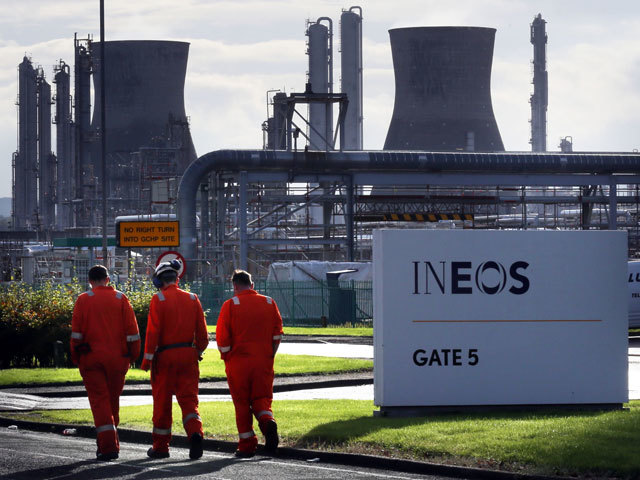
Politics and energy are never far apart but the past few weeks have brought them into even closer alignment than usual. And there are huge lessons to be learned, or at least discussed.
From a Scotland perspective, the most dramatic events have surrounded the Grangemouth petrochemicals and refining complex as it has formed a massive part of the Scottish industrial landscape for as long as most of us can remember.
Indeed the Falkirk area employs more people in manufacturing than the rest of Scotland combined.
Last month, we got a sharp reminder of what politics should actually be about. While years are being wasted on arguing around how many angels can dance on the head of a constitutional pin, the real stuff of politics is still jobs, security and prosperity.
In my view these priorities are now sadly neglected on the Scottish political landscape.
When the Grangemouth plant reached the precipice, you could not move for ministers crying woe and desperately pledging to work together for a happy outcome. But where had they been in all the preceding months?
This was a slow-motion car-crash in the making. The time for political intervention and the banging of heads is before a crisis is entering its final stage. Bizarrely, Scotland has more politicians than at any time in its history but less focus on the things that really matter in the here and now.
And what are the longer-term lessons of the Grangemouth reprieve?
They must surely include the imperative that inter-dependence within our small island must be maintained. The implications for North Sea production if the Grangemouth refinery, the Siamese twin of the petrochemical plant, ever goes down would be catastrophic.
The Grangemouth refinery supplies 70% of the fuel used at Scotland’s filling stations as well as delivering to Northern Ireland and the north of England.
It is a fully integrated part of a UK-wide system. But if it was lost, Scotland would become a massive importer of these products with corresponding economic implications.
None of this can be swept under the political carpet with glib words and hazy predictions about the future – far less what proved to be totally empty words about nationalisation.
Ten thousands jobs rely on the Grangemouth site. That is real politics, not an optional extra when crisis arises. And let’s hope that lesson has been learned.
Then we had the UK Government’s announcement of a strike price for nuclear power in order to get Hinkley C off the ground.
Fortunately, there is always room for differing points of view in the columns of Energy, so at this point I diverge from the opinion of my distinguished colleague, Dick Winchester.
This was a deal which simply had to be done. Indeed, it should have been done years ago when there more players in the field and the French and Chinese would have been less able to turn the screw, as they have undoubtedly done.
But if not new nuclear, then what?
Of course it is impossible to predict how energy sources will develop over the next 50 years; what is happening now in the US is proof positive of that.
But that is exactly why we need the certainty, in terms of both supply and price, which new nuclear will provide. A lot of other things might happen – but then again they might not.
Governments cannot rely on hopes and projections when the issue at stake is security of electricity supply. Continuity of nuclear generation is a necessary banker around which other developments can be built.
The realistic alternative, I believe, would be an unhealthy reliance on imported gas and that is the market-driven option that has to be safeguarded against.
I have always supported nuclear new-build but have never thought it would happen unless there was the offer of a guaranteed price far into the future.
The memory of how British Energy went bust because the wholesale price of electricity fell below the point of viability for just a few months is far too recent and relevant. That reality has now been accepted.
My big regret, of course, is that, as well as 5,000 construction jobs and 1,000 permanent ones in Somerset, we are prohibited by the Scottish Government from even contemplating the same outcome in Ayrshire.
My former constituents would be just as jubilant to see a Hunterston C as are their counterparts in the south-west of England.
Meanwhile, the whole argument about energy prices rages on. True to form, the Big Six have staggered their announcements of hikes which all hover around the 10% mark.
It was SSE’s turn to go first and they got the initial flak. The review which David Cameron has now established has much to look at depending on whether or not it chooses to do so.
With Sir John Major endorsing action against the power companies to limit their profits and question the justification of these increases, the only people now dismissing any such option is the Scottish Government, which is so much in hock to SSE and Scottish Power on other issues that it regards discretion as the better part of valour.
Instead, we are told by Nicola Sturgeon that the Scottish Government will, hey presto, cut bills by 5% after independence.
The relevant question, of course, is “5% of what?”.
Assuming independence, once we are paying for our own renewables infrastructure as well as importing nuclear power from England, I fear it would be 5% of rather a lot!
Recommended for you
